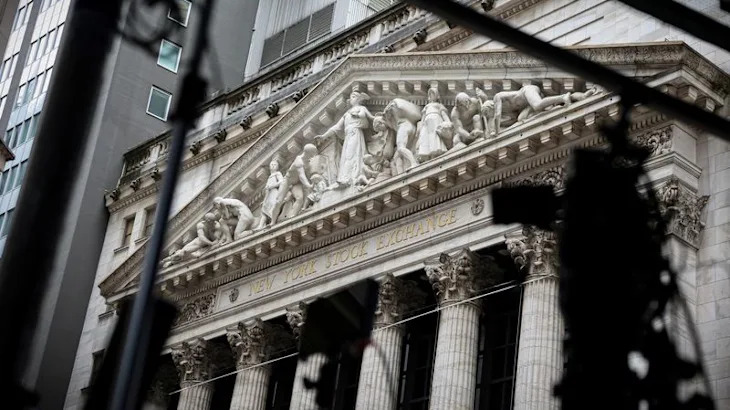Analysis-Tariff-whipped Wall Street wonders: will Trump blink?
By Davide Barbuscia
NEW YORK (Reuters) -Investors are trying to game out how much tolerance U.S. President Donald Trump has for stock market losses after his latest tariff policies ignited a more than 10% wipeout on Wall Street, with some still holding out hope of eventual relief.
A so-called "Trump put" - the option market equivalent of a presidential backstop for equities - underpinned Trump's first term, as he frequently cited stock market strength as proof his policies were working. Over the course of his first presidency the S&P 500 benchmark rose 68% and scaled record highs, while Trump cheered its progress, tweeting more than 150 times about the stock market.
This time around, hope that such a Trump Put still exists is evaporating, or at the least, investors are coming around to the view that Trump is much more inclined to ride out sharp falls. The S&P and Nasdaq are down over 15% and 20% since his inauguration in January respectively.
"The whole notion of tariffs and trade policy has been such an integral part of Donald Trump’s psyche, I don’t see it abandoned," said Michael Rosen, chief investment officer at Angeles Investments, who said any pain level likely to cause Trump to change course remained a long way away.
Previous assumptions that Trump's pro-business agenda would buoy risk assets similarly had already been fading as his trade policies rattled investors over the past few weeks.
But the more-aggressive-than-anticipated tariffs unveiled on April 2 deepened the market selloff, leaving investors questioning whether the Trump put was gone, or might eventually reappear through tariff rollbacks after any trade deals.
For Bob Elliott, chief executive officer and chief investment officer of Unlimited Funds, the selloff still had a long way to go before any policy turnaround.
"It takes 20-30% declines in stocks to get there. So the decline so far is not big enough," he said.
Some were more hopeful the market fall could eventually induce a change of course.
"I don't think (Trump) is going to be highly tolerant of massive stock market declines - he'll see his popularity tank, and it will endanger his whole agenda,” said Kevin Philip, partner at Bel Air Investment Advisors. "I don’t see any way out of this if he doesn’t come up with deals or reasons to change course.”
The huge market falls - not seen since the beginning of the COVID-19 pandemic in 2020 - even caused speculation online that Trump was intentionally "crashing" the market to force the U.S. Federal Reserve to lower interest rates while making stocks more affordable to middle-class investors.
Trump on Friday retweeted a social media post bearing the caption "Trump is Purposely CRASHING The Market" and featuring images of the president pointing at a large downward red arrow and of him signing executive orders at the White House.
Speaking to reporters aboard Air Force One on Sunday, Trump said he was not intentionally engineering a market selloff and the rout was the result of a "medicine" needed to fix the U.S. trade deficit.
Trump and his team have said their policies may cause short-term pain but will eventually revive manufacturing and spur growth. On Friday he told investors pouring money into the United States that his policies would never change.
White House spokesman Kush Desai said in a statement to Reuters: "Just as it did during President Trump’s first term, the administration’s America First economic agenda of tariffs, deregulation, tax cuts, and the unleashing of American energy will restore American Greatness from Main Street to Wall Street.”
PAIN LEVEL
Some investors fear that weakening consumer confidence, an escalating trade war, and rising price pressures could deal a harsh and lasting blow to the economy, regardless of any potential economic upside down the line.
For Brian Bethune, an economist at Boston College, the disruption caused by the tariffs was too abrupt to allow U.S. businesses to soften the blow, despite their resilience.
"You’re putting so many sandbags on the balloon, it’s going to come back down to earth with a thud," Bethune said.
In the two sessions after the tariff decision was unveiled on Wednesday, the S&P 500 has tumbled 10.5%, erasing nearly $5 trillion in market value, marking its most significant two-day loss since March 2020. On Monday, the S&P was down 0.12%.
NO CAVALRY
Hopes that the market could be propped up by actions by the U.S. Federal Reserve have also taken a knock.
Trump on Friday called on Federal Reserve Chairman Jerome Powell to cut interest rates, saying it was the "perfect time" to do so. But stock losses deepened past 5% after Powell on Friday warned that the new tariffs would likely push inflation higher while slowing economic growth, suggesting the Fed was unlikely to rush in to cut rates.
"The market is still digesting the great deal of uncertainty and I think it's also digesting the fact that both Trump and Powell have made it clear that the cavalry is not coming to immediately cause things to bounce back up," said David Seif, chief economist for developed markets at Nomura in New York.
Rising prices could reduce the Fed's ability to take supportive actions as it has in previous market downturns or if economic conditions deteriorated significantly, analysts said. This could take off the table a so-called "Fed put," or a perceived tendency of the central bank to run to the aid of financial markets.
“Who blinks first? The Fed or President Trump? The Fed has made it clear that with inflation where it is and unemployment where it is, (they’re) comfortable without doing anything right now,” said Ryan Detrick, chief market strategist at Carson Group in Omaha. “We think Washington likely has to blink first to present some type of positive news."
(Reporting by Davide Barbuscia, Carolina Mandl, Isla Binnie, Ross Kerber, Stephen Culp, editing by Megan Davies and Deepa Babington)
